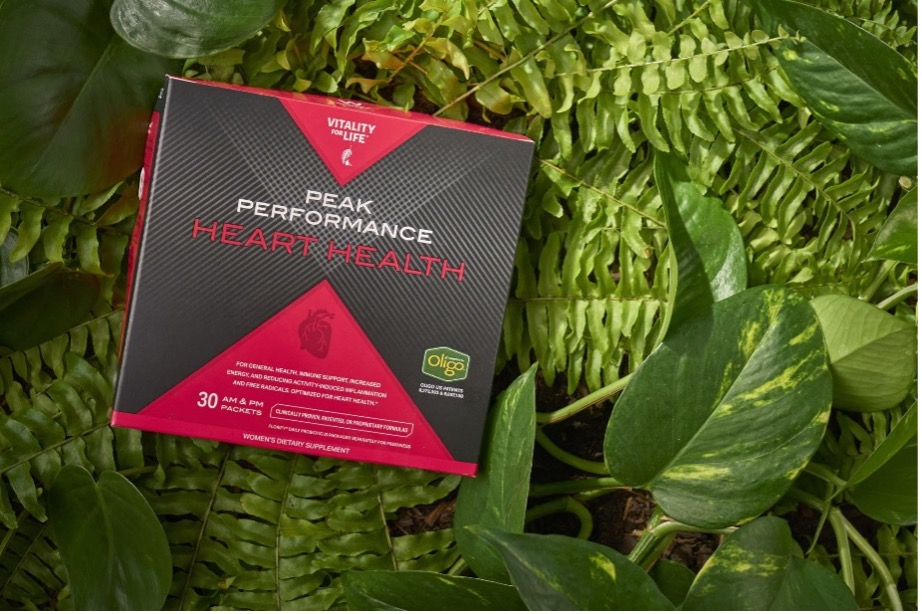Having a Change of Heart This American Heart Month

Your heart beats about 100,000 times each day—that’s a lot of work! And what better time than now to show it the love and care it deserves?
For decades, heart disease has been the leading cause of death for Americans. But here’s the good news: so much of your heart health is in your hands! With a few simple daily decisions, you can strengthen your heart and reduce your risk—starting today!
American Heart Month is a time to raise awareness of heart disease and heart-healthy practices, like taking the Peak Performance Heart Health Pack.
Sharon, a Melaleuca Member, loves what it has done for her health. Sharing an online review of Peak Performance Heart Health on Melaleuca.com, she wrote: “My doctors LOVE these vitamins and I do too,” she says. “Now I can eat my protein without fear, with a good balance of vegetables and some fruits. I’m truly delighted with this product.”
“Absolutely won’t go a day without my Peak Performance!” wrote Sandee, another Melaleuca Member, as a Peak Performance Pack review on Melaleuca.com. “Both my husband and I take it daily and have had a big improvement in our labs. I think everyone should be taking this!”
Peak Performance Heart Health brings together Melaleuca’s Core 6 supplements plus three additional supplements specifically designed to address the factors that lead to heart disease.*
How Did American Heart Month Begin?
Each February, Americans raise awareness of heart disease prevention during American Heart Month, also sometimes called Heart Health Awareness Month or National Heart Month. But did you know that it was actually December of 1963 that marked the beginning of American Heart Month? President Lyndon B. Johnson, under Proclamation 3566, formally declared that February of the next year would mark the beginning of an annual American Heart Month.
In the proclamation, President Johnson stated that “it is essential to the health and well-being of our nation that our citizens be made aware of the medical, social, and economic aspects of the problem of cardiovascular diseases, and the measures being taken to combat them.”
Common Risk Factors for Heart Disease
High Blood Pressure
The Centers for Disease Control and Prevention considers hypertension, or high blood pressure, to be a “major risk factor for heart disease.” With no obvious symptoms, high blood pressure is considered a silent killer. So it’s crucial to be proactive by getting your blood pressure measured and then actively making changes to reduce it.
Cholesterol
Cholesterol is a vital molecule that your body needs for everything from hormone production to cell membrane structure. While your liver produces cholesterol, what many don’t realize is that elevated blood cholesterol can be your body’s response to inflammation in arterial walls. Like a repair crew rushing to fix damage, cholesterol levels may rise as part of your body’s healing response (chronically high levels, however, are still a concern).
The real concern isn’t cholesterol itself, but rather what happens when chronic inflammation and insulin resistance affect how cholesterol behaves in your bloodstream. Though important, this is why looking at total cholesterol alone doesn’t tell the full story. It’s more important to understand the size and type of cholesterol particles, along with other markers like triglycerides and inflammation levels, to get a true picture of cardiovascular health.
Stress
We all get stressed in moments or during short periods throughout our lives—usually called acute stress. But chronic stress is when that anxiety stays around, or is persistent through a longer period of time. Both types can be harmful, but persistent stress can be particularly concerning.
Rachel Lampert, a Yale Medicine cardiologist, says that “stress can cause higher levels of inflammation in the body that contribute to increases in plaque buildup in the arteries.”
Stress can release adrenaline, which raises blood pressure. Cortisol is also released as a consequence of stress and can also increase blood pressure, as well as cholesterol and blood sugar.

How to Reduce Risk Factors for Heart Disease
You can take charge of your heart health today! It’s simple when you break it down into steps:
- Eat smart: Cut back on processed foods and eat more whole foods
- Move daily: Aim for 30 minutes of physical activity
- Manage stress: Swap out screen time for quiet time, like walks and meditation
- Support your heart: Take Peak Performance Heart Health for essential nutrients
Healthy Diet
Avoid processed meats and carbs as well as fried foods and increase your take in natural, whole foods. Reducing your intake of salty foods (which includes many processed foods) will decrease strain on your kidneys, and increasing your potassium intake will help relax the walls of your blood vessels.
Supporting healthy blood pressure involves maintaining proper insulin sensitivity, adequate mineral balance (especially sodium and potassium), and reducing inflammatory foods that can affect vascular function.
Exercise
Regular exercise is a great way to lower blood pressure, maintain a healthy blood pressure range, and, of course, reach or maintain a healthy weight. Both aerobic exercise and strength training are important, and both should be utilized for a well-rounded exercise routine.
According to Johns Hopkins, exercise “helps to control or modify many of the risk factors for heart disease.” It also helps your muscles get oxygen from your blood, reduces stress hormones, increases HDL levels, and even helps to control triglycerides.
Stress Management
Managing stress and anxiety is a little different for each person. But the bottom line is that it almost always involves removing stressors from your life and proactively seeking to fill your life with positive and encouraging influences.
You can’t control everything. But you may be surprised by what is in control. If the morning or evening commute makes the veins in your forehead pop out, try going to or leaving work at a different time. If the news gets you depressed (we’re all in this boat!), put your phone down or turn off the TV and take a break from it.
Then them with de-stressors. Go for walks, take relaxing baths, play games with your friends and family, listen to calming music, meditate, take time to make a wholesome meal—the ideas really are endless.
Peak Performance Heart Health

Just like every Peak Performance Pack, Peak Performance Heart Health features the Core 6 supplements to deliver essential vitamins and nutrients:
- Vitality Multivitamin & Mineral
- Recover AI Inflammatory Response Support
- CellWise Broad Spectrum Antioxidant
- ProvexCV Blood Pressure Support
- Florify Daily Probitoic
- CardiOmega EPA
Peak Performance Heart Health also contains K2-D3 to move calcium from your blood to your bones and teeth; CoQ10+ to provide needed fuel for high-energy organs like your heart; and Phytomega to help naturally reduce the amount of cholesterol you absorb.
These three supplements are optimized to support healthy heart function, maintain healthy blood pressure, support normal cholesterol levels, and more.* For further information on these supplements, read our previous post on heart health month.
“It’s changed my life forever,” says Melaleuca Member Tammi. “They are the best supporting supplements ever. So much energy and my body is fulfilled with all the nutrients it needs that isn’t given in our food and it helps sustain my heart too.”
Celebrate American Heart Month the Right Way!
This February marks 61 years of American Heart Month, but it only takes one simple decision to protect your heart!
This February, don’t just educate yourself—take action! Small steps add up to a healthy lifestyle and greater heart health. Be proactive in eating healthier meals, especially fruits and vegetables. Take time to de-stress and establish peaceful moments in your life. Get moving and establish a simple workout routine, or even just make time each day to walk for 10 to 15 minutes.
And if you’re not already, take the Peak Performance Heart Health Pack to support your overall cardiovascular health.*
*These products have not been evaluated by the FDA and are not intended to diagnose, treat, cure, or prevent any disease.
